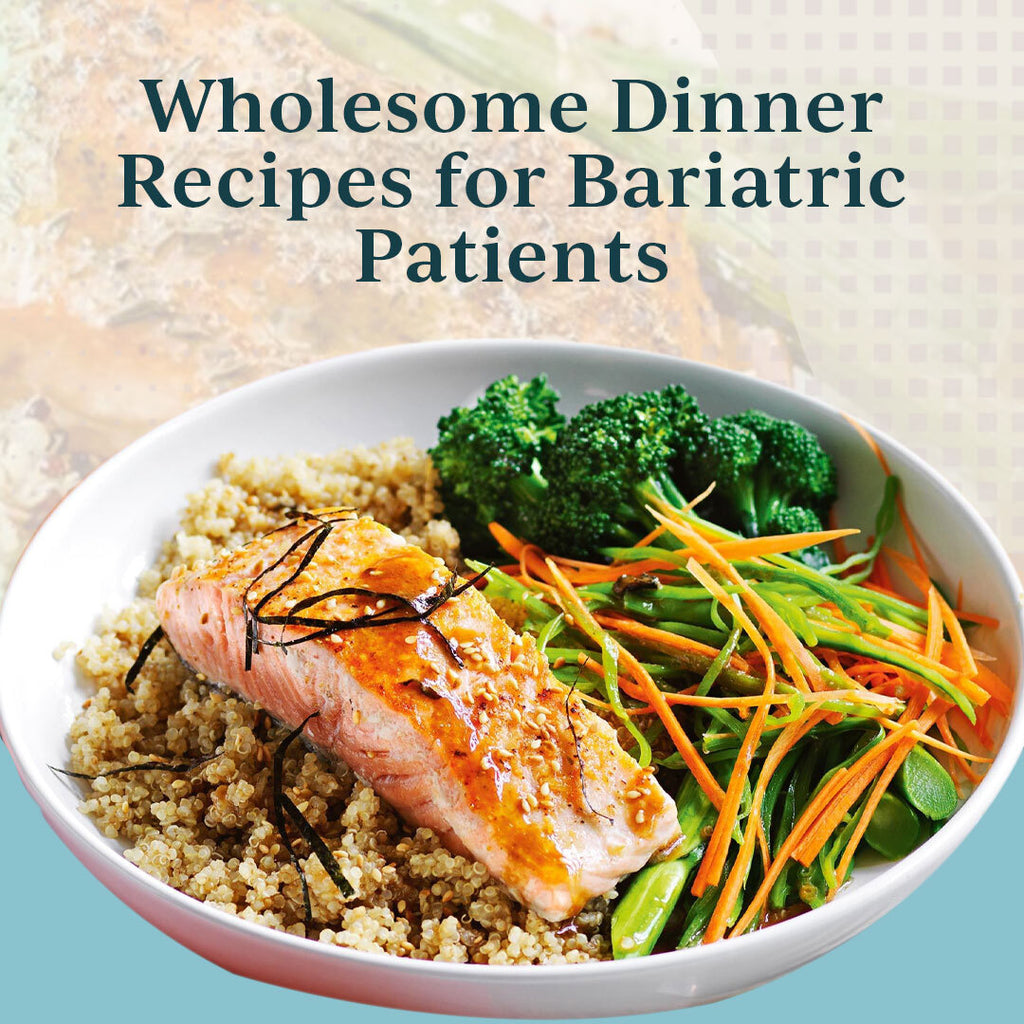
Bariatric Recipes & Meal Plans: Essential Vitamin Tips
Bariatric surgery can be an effective way to lose weight and improve your well-being. However, while it comes with these perks, you must make several lifestyle changes for long-lasting results. Post-surgery, one of the most essential changes you must make involves altering your diet to ensure you meet your nutritional needs.
In this guide, we'll explore the key nutrients for bariatric patients, how to incorporate them into your diet, common pitfalls to avoid, and more.
Key Nutrients for Bariatric Patients

Bariatric surgery alters the digestive tract, making it difficult for the body to absorb certain nutrients. That said, here are some key nutrients you may need to prioritize after undergoing surgery:
Protein: Protein plays a pivotal role post-surgery. It helps heal wounds, repair tissues, and promote metabolism. Aim for a minimum of 60-75 grams of protein daily.Calcium: Calcium is essential for strong teeth and bones. Aim for a minimum of 1,200-2,000mg of calcium daily. Generally, calcium citrate is the best form of calcium for post-surgery patients because it absorbs more easily than calcium carbonate. Vitamin D: Like calcium, vitamin D is pivotal for bone health, and it helps the body absorb calcium. Aim for 800-1,000 International Units (IUs) of vitamin D daily. Our Calcium & Magnesium formula is rich in calcium, magnesium, and vitamin D.Iron: Iron helps to prevent fatigue by transporting oxygen throughout the body. Aim for a minimum of at least 18mg of iron daily. Our Vegan Liquid Iron formula is packed with iron to boost your energy levels.Vitamin B12: Vitamin B12 is pivotal to nerve function and red blood cell production. Aim for at least 500mcg of vitamin B12 daily. You can supplement your meals with our Pure Methyl B12 formula to get your daily dose of vitamin B12.
- Folate: Folate, folic acid, or vitamin B9 plays a critical role in cell growth and DNA production. It is also especially important during early pregnancy, as it minimizes the risk of birth defects. Aim for at least 400mcg of folate daily.
Creating Balanced Bariatric Meals
Post-surgery, a balanced diet plays a critical role in recovery and long-term weight management. However, creating tasty dishes that provide all the essential nutrients you require can feel like a culinary conundrum. Uncertain what to prepare? Let's explore some nutrient-rich breakfast, lunch, and dinner ideas to inspire you:
Vitamin-Rich Breakfast Ideas

Kickstart your day with a breakfast that not only delights your palate but also provides the essential nutrients you need. Opt for a nutrient-packed smoothie blending low-fat Greek yogurt, a handful of berries, a sprinkle of chia seeds, and a banana. This concoction provides a healthy dose of protein, calcium, vitamin C, potassium, fiber, and antioxidants.
Alternatively, if you prefer something more savory, consider scrambled eggs with spinach and tomatoes. Eggs are an excellent source of protein, while vegetables provide vitamins A, K and various minerals.
Finally, for a warm start, consider oatmeal topped with sliced almonds and fresh fruit. Oats are rich in fiber that aids digestion, and they also contain copious amounts of vitamin B12, vitamin E, zinc, magnesium, and iron.
Nutrient-Dense Lunch Options

Crafting a nutrient-rich lunch is critical to sustaining your energy levels throughout the day. Opt for a tuna salad lettuce wrap featuring a mix of low-fat mayo, chopped onion, celery, and dill. This not only provides a substantial amount of protein but also vitamins B12, K, and C.
For a heartier option, consider a quinoa bowl with roasted vegetables and chickpeas. Quinoa is a complete protein, meaning it contains all nine essential amino acids, while colorful vegetables provide various vitamins and minerals. Enhance the meal's nutritional profile by adding a small serving of avocado for a dose of monounsaturated fats.
Alternatively, for another take on salad, consider chicken Caesar salad with lean chicken, a light Caesar dressing, shaved Parmesan cheese, and shaved tomatoes. This tasty dish provides a good amount of protein, calcium, and vitamin D.
Wholesome Dinner Recipes for Bariatric Patients

Dinner is an opportunity to end the day with a delicious and nutritious meal. Opt for grilled salmon accompanied with quinoa and steamed broccoli. The salmon offers a healthy dose of omega-3 fatty acids, integral to heart health, while quinoa provides a protein boost, and broccoli adds fiber, vitamin C, and folic acid.
Alternatively, for a vegan option, consider lentil and vegetable stew. Lentils are rich in protein, and adding vegetables like carrots, celery, and zucchini can make the meal vitamin- and mineral-packed.
Finally, for a hearty option, consider turkey meatloaf with cauliflower mash. Cauliflower is a low-calorie alternative to traditional rice, and turkey adds protein to the mix.
Snacking Smart: Bariatric Friendly Options

Post-bariatric surgery, you should avoid sugary treats, as they can impede your weight loss progress. However, that doesn't mean you must only eat bland meals. Here are some tasty, bariatric-friendly snack options:
Nuts and seeds: Almonds, walnuts, pistachios, or sunflower seeds provide healthy fats, protein, and fiber, keeping you satiated. Fruits and vegetables: Fruits and vegetables are your best friends post-surgery. Opt for whole, fresh fruits like apple slices with a sprinkle of cinnamon or a handful of berries to satisfy sweet cravings. Alternatively, try out vegetable sticks with hummus or guacamole.
- Smoothies: Try out protein-rich smoothies. Just bear in mind certain smoothies are calorie-dense, so portion control is important.
Incorporating Vitamins in Post-Op Recovery Meals
While bariatric supplements can play a critical role post-surgery, your post-operative meals can also provide essential vitamins. Here's how to strategically enhance your recovery through smart food choices and preparation methods:
Prioritize nutrient absorption: Bariatric surgical procedures might temporarily affect your body's ability to absorb nutrients. Steaming, baking, or poaching are gentle preparation methods that preserve nutrients.Consider food pairings: Certain food combinations can enhance nutrient absorption. For example, pairing iron-rich spinach with vitamin C-rich citrus fruits can enhance iron absorption.Incorporate variety: A diverse plate ensures you get a spectrum of vitamins and minerals. Aim for different colors and textures, including fruits, vegetables, whole grains, and lean proteins in every meal.
Finally, prioritize hydration as sometimes it masquerades as hunger and can inhibit nutrient absorption. Keep a reusable water bottle handy and sip throughout the day. For a refreshing twist, add slices of cucumber or lemon to your water.
Sample Bariatric Meal Plans
Ready to indulge in nutritious yet healthy meals. Here are two sample meal plans tailored to different stages of your post-bariatric surgery journey. Remember, these are just samples. You may adjust them to fit your needs and preferences.
Early Post-Surgery
Two to eight weeks after surgery, it's advisable to take liquids and soft foods to avoid overwhelming your digestive tract. That said, here's a sample post-op menu:
Breakfast: Protein smoothie with low-fat milk, spinach, berries, and protein powder. If you're vegan or lactose intolerant, you can substitute the low-fat milk with unsweetened almond milk.Mid-morning snack: Greek yogurt with a handful of berries or mashed banana.Lunch: Low-fat chicken noodle soup.Mid-afternoon snack: Unsweetened applesauce with a dash of chia seeds.Dinner: Puréed chicken breast with mashed sweet potato and steamed broccoli.
Later Post-Surgery
Two to six months after surgery, you can start transitioning to solid foods. Here's a sample menu for the period:
Breakfast: Scrambled egg with spinach and diced tomato, whole-wheat toast with avocado slices.Mid-morning snack: Handful of almonds and berries.Lunch: Chicken Caesar salad with a light Caesar dressing, shaved Parmesan cheese, and cherry tomatoes.Mid-morning snack: Vegetable sticks with hummus or guacamole.
- Dinner: Grilled salmon with quinoa and steamed broccoli.
Tips for Successful Meal Prepping
Meal prepping is critical to ensuring you stay on track with your weight management goals post-surgery. But navigating the kitchen post-surgery requires extra planning and savvy. Here are some tips to streamline your meal prep:
Create a meal plan: Begin by planning your meals for the week based on your doctor or dietician's guidelines. Use simple meal plans like the one provided above and ensure you include various proteins, vegetables, and whole grains.Batch cook meals: Choose recipes that allow for bulk preparation, like roasted vegetables, soups, or protein-rich casseroles, as they can come in handy on busy days.Measure portions: Post-surgery portion control is critical. Use measuring cups and portion containers to ensure you stick to the recommended portion sizes.
- Label containers: Clearly label containers with contents and dates for easy identification. This also helps track your food intake and ensure freshness.
Common Pitfalls to Avoid
Post-surgery, it's essential to maintain discipline if you want to keep your weight in check. Bearing that in mind, here are some common pitfalls and how to avoid them:
Skipping meals: Skipping meals can lead to overeating later. Opt for smaller, frequent meals and snacks throughout the day to keep hunger pangs at bay.Neglecting hydration: Dehydration can hinder your recovery and even masquerade as hunger. Stay hydrated throughout the day with water, herbal teas, and diluted fruit juices.Restrictive mindset: While it's crucial to make mindful food choices, excessively limiting your food options can lead to nutrient deficiencies. Ensure your meals are diverse, incorporating various nutrients to meet your dietary needs.Eating unhealthy treats: Avoid indulging in unhealthy, high-calorie sugary treats. Surround yourself with healthy options to avoid succumbing to temptation.
- Skipping follow-ups: Don't skip follow-up appointments with your healthcare team. Regular check-ins allow for adjustments to your meal plan, ensuring it aligns with your changing dietary needs post-surgery.
Conclusion
Bariatric surgery can make it challenging to absorb nutrients like vitamin B12, vitamin D, calcium, iron, and folic acid. While eating a balanced diet and following the above tips can help you get these nutrients, doctors and dieticians still recommend taking bariatric vitamins to prevent nutritional deficiencies. Check out our collection for a wide range of bariatric liquid vitamins.
FAQs
Can I Still Eat My Favorite Foods After Surgery?
You can still eat most foods but in moderation. Treat yourself occasionally, but be mindful of portion sizes and choose healthier alternatives when possible.
Are There Any Foods I Should Avoid Post-Surgery?
Doctors and dieticians recommend avoiding sugary drinks, fried foods, and processed snacks, as they can hinder weight loss. Opt for healthier alternatives like lean proteins, whole grains, and vegetables.
How Long Will It Take for My Taste Buds to Adjust to New Foods?
Everyone's different when it comes to adjusting to new foods. While some people adjust almost immediately, others can take up to even three months. Experiment with herbs, spices, and low-fat sauces to enrich your meals.
How Do I Deal With Cravings for Unhealthy Foods?
Substitute with healthier alternatives, stay hydrated, and address the root cause of cravings. Consult a dietician for personalized strategies for combating cravings.
Can I Follow a Vegetarian or Vegan Diet Post-Bariatric Surgery?
Yes, with careful planning. Ensure you get enough protein from protein-rich plant-based sources like quinoa and lentils, and consider bariatric supplements for nutrients like iron, calcium, and vitamin B12.


Leave a comment